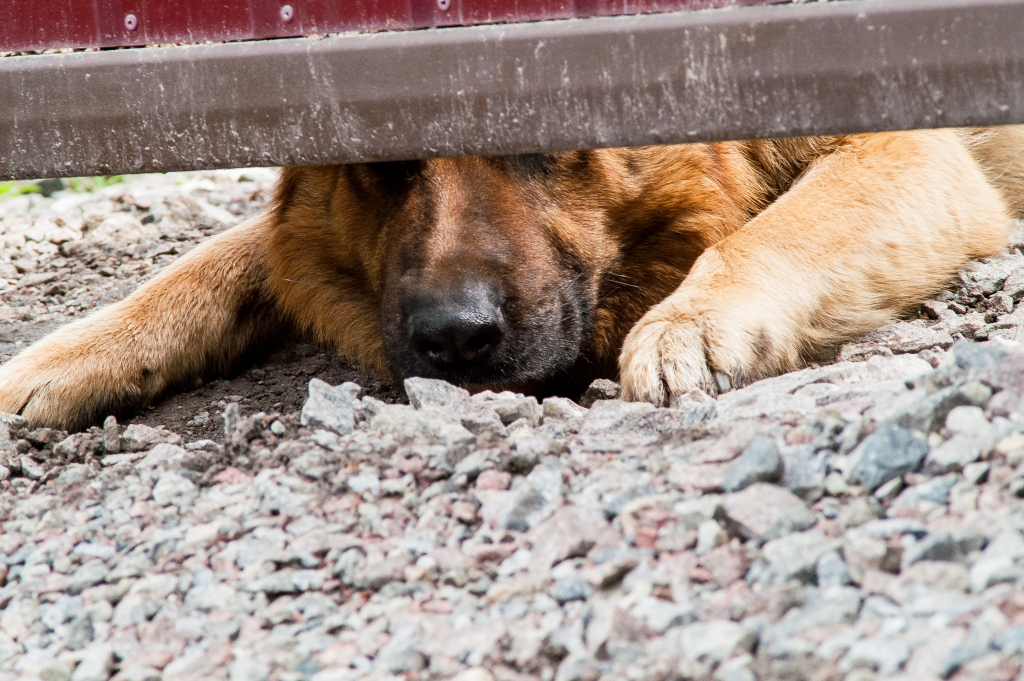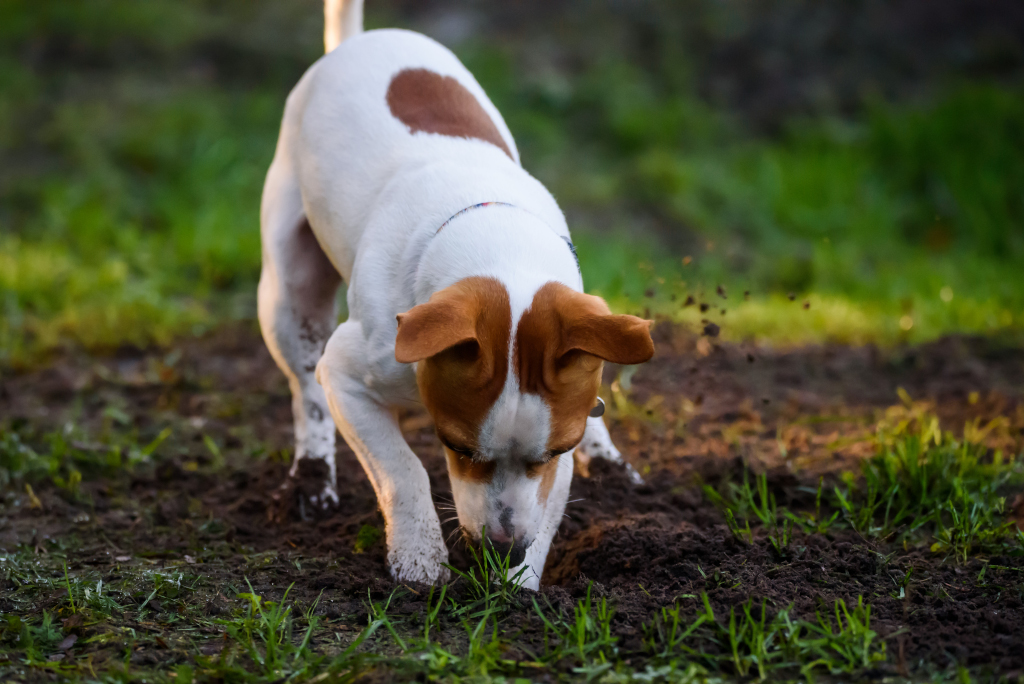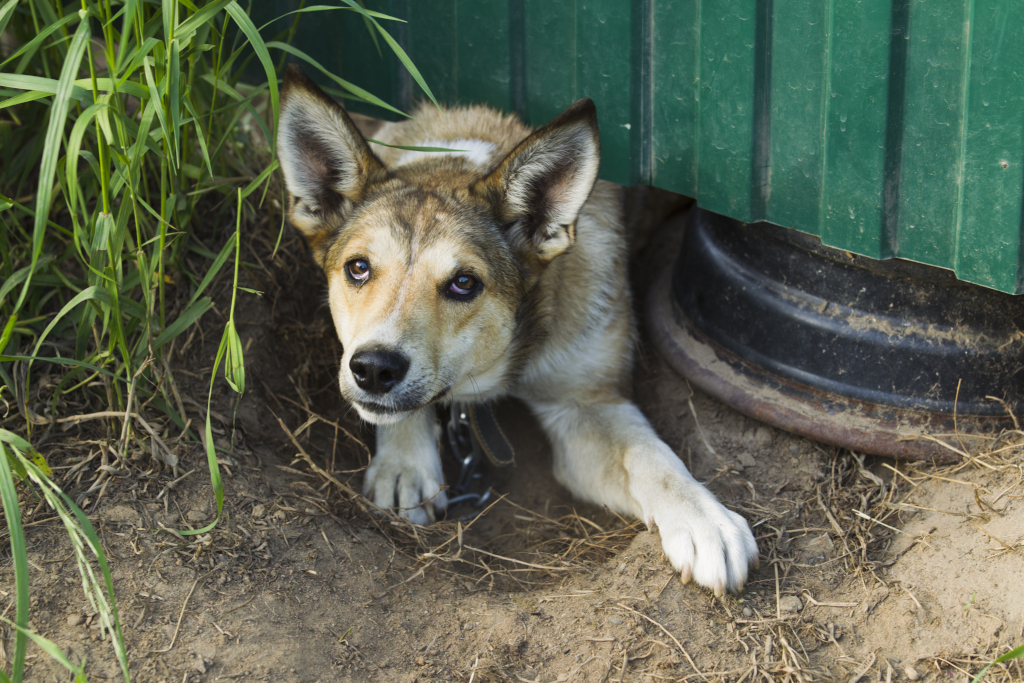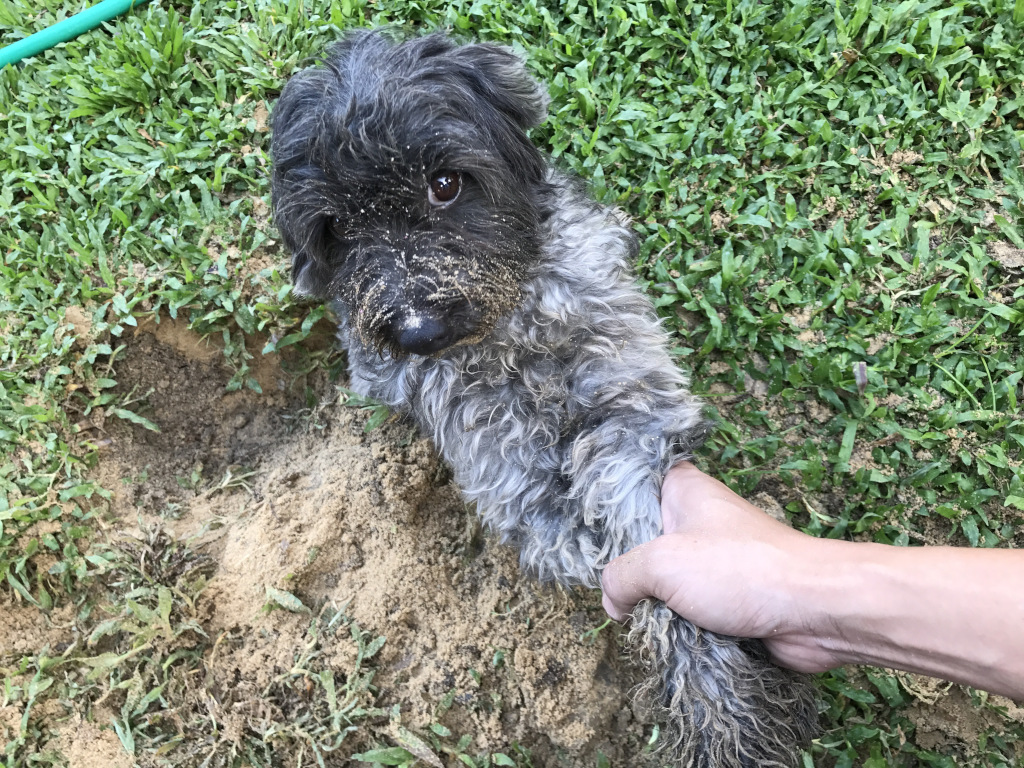
Dogs are a joy to have, providing unending companionship and entertainment. They’re notorious for their playful antics and inexhaustible energy, traits that are a delight to their owners.
But every now and then, some of this energy gets directed towards activities that aren’t as enjoyable, especially for a homeowner who cares about the aesthetics of their yard. One such activity is digging under fences.
As a dog owner, finding that your furry friend has been making escape tunnels under your fences can be disconcerting. This doesn’t only ruin your beautiful yard but also poses risks to the safety and well-being of your four-legged friend. It becomes crucial, then, to find effective solutions to this problematic behavior.
Understanding the roots of the issue and implementing a strategic approach is paramount. In this blog post, we will delve into the reasons dogs dig holes and explore numerous solutions to curb them.
Whether it’s modifying your dog’s digging behavior through training, taking preventative measures, or employing physical reinforcements to your fence, we’ve got it covered. This comprehensive guide aims to provide you with all the necessary tools to ensure your backyard stays intact and, more importantly, your dog remains safe.
Let’s dive into the world of canine behavior, decipher why dogs take up the role of ‘landscape architects,’ and unearth the best solutions for dogs who love to dig under fences. Welcome to the journey towards a safer and dig-free environment for your beloved pet.
Stay tuned and read on!
Understanding the Reasons Dogs Dig

Before we jump into the solutions, it’s essential to understand why dogs dig in the first place. This behavior is not just about causing havoc in your garden or being disobedient; it’s often a manifestation of your dog’s needs, instincts, or emotions. By understanding what motivates this activity, you’ll be better equipped to find the most suitable solution. Let’s delve into some common reasons:
1. Boredom and lack of exercise
Dogs are naturally active creatures that require both physical and mental stimulation. If they don’t get enough of this, they may resort to creating their own fun. Digging can be an exciting activity for a bored dog, providing them with a sense of purpose and a way to expend pent-up energy.
You May Also Like: How to Exercise Dogs in Winter
2. Hunting or seeking prey
Dogs originally bred for hunting, like Beagles, have the instinct to find and catch prey. If they feel the presence of burrowing animals under your garden or find a scent that interests them, they may try to dig their way through it to get to them.
You May Also Like: Best Hunting Dog Breeds
3. Seeking comfort or protection
Dogs often dig in response to weather conditions. In hot weather, they might dig holes to lie in the cool earth. In cold conditions, they may dig to create a warmer, insulated spot.
You May Also Like: Winter Dog Safety Tips
4. Escape and exploration
Dogs are curious by nature and may dig under fences to explore the world outside their yard. This is particularly common in breeds known for their adventurous spirit, like Siberian Huskies.
You May Also Like: Guide to Training Your Dog to Stay in an Unfenced Yard
5. Anxiety and stress
Just like humans, dogs can exhibit anxiety and stress in various ways. Digging can be a form of stress relief or a sign that your dog is trying to escape from a stressful environment.
You May Also Like: Best Calming Collars for Dogs: To Reduce Anxiety
6. Breed-specific tendencies
Some dog breeds are more prone to digging than others. Breeds like Dachshunds and Terriers, for instance, were originally bred to burrow and hunt for small prey, so they may be more inclined to dig.
7. Craves Companionship
Dogs are incredibly social creatures and naturally crave companionship. If they spend a lot of time alone in the yard while you’re at work or running errands, they might start feeling lonely. Digging under the fence can be an attempt to go out and find some social interaction. They might be seeking other dogs, people, or even just a more stimulating environment.
8. Nature Calls
The last reason could be what we fondly term ‘nature calls.’ Female dogs in heat may dig under fences to make themselves available to potential mates. Similarly, male dogs may smell a female in heat nearby and dig under the fence in an attempt to reach her.
Understanding the root cause behind your dog’s digging habit is crucial before deciding on the appropriate solution. As we delve deeper into the various strategies in the next sections, keep these potential causes in mind. Knowing what drives your dog will help you tailor a solution that is both effective and considerate of your dog’s needs and instincts.
Remember, while the digging might be causing you stress, it’s likely a symptom of something your dog is experiencing. Compassion and patience go a long way in resolving this issue successfully.
Potential Consequences of Dog's Digging Behavior

Now that we’ve explored why your furry companion might be behaving like an enthusiastic miner, let’s delve into the potential consequences of this digging behavior. These risks further underscore the importance of finding effective solutions.
1. The Risk of Escape and Getting Lost
The most immediate risk is, of course, that your dog may escape and get lost. Once your dog has dug a tunnel under the fence, there’s little stopping them from exploring the outside world. This could lead them into busy roads, unfamiliar territories, or even into the path of less friendly animals.
You May Also Like: Best GPS Dog Tracker to Keep Tabs On Your Dog
2. Potential for Injury
Digging under fences can expose your dog to potential injury. They might hurt themselves on sharp rocks, broken glass, or other dangerous objects buried in the ground. If they escape, they may encounter hazards like traffic or unfriendly dogs.
3. Damage to Property
Beyond the safety risks to your dog, this behavior can also cause significant damage to your property. Repeated digging can ruin your yard, destroy plants, and undermine the structural integrity of your fences.
4. Neighborhood Disputes
If your dog’s digging is disruptive to your neighbors (say, if your furry friend has taken a liking to their garden as well), this could lead to neighborhood disputes.
5. Legal Implications
Depending on where you live, there might be legal implications if your dog escapes and causes damage to other properties or injures another person or pet.
Understanding these potential consequences can help us appreciate why it’s so important to find effective, humane solutions to stop dogs from digging under fences. In the following sections, we’ll explore a range of preventative measures, training tips, physical deterrents, and products that can help keep your canine safe and your fences intact.
Proactive Strategies to Mitigate Digging Behaviour
Prevention is often the best cure, and this adage holds true for our dog-digging problem as well. The first step to preventing your dog from digging under fences is to create an environment that meets their needs and reduces the desire to dig. Here’s how you can achieve this:
1. Providing Enough Physical and Mental Stimulation
Regular exercise is crucial for dogs, especially for high-energy breeds. A tired dog is a happy dog, and they’re less likely to indulge in destructive behaviors like digging. Alongside physical exercise, ensure your dog gets plenty of mental stimulation. Puzzle toys, interactive games, and regular training sessions can help keep your dog’s mind sharp and occupied.
You May Also Like: Tips for Bike Riding With Dogs
2. Regular Exercise and Play Sessions
Incorporate play into your dog’s daily routine. Fetch games, tug-of-war, or even a run around the block can help burn off some of that excess energy. Remember, a well-exercised dog is less likely to resort to digging for entertainment.
You May Also Like: Guide to Running with Dogs: Everything You Need to Know!
3. Offering Chew Toys and Interactive Games
These can be lifesavers for when you need to leave your dog alone. Chew toys satisfy your dog’s natural desire to gnaw, and toys that can be filled with treats can keep them engaged for hours on end.
You May Also Like: Tips for Stopping Dogs From Destroying Things
4. Keeping Your Dog Indoor When Unsupervised
If you’re not going to be available to keep an eye on your dog, it’s always best to keep them in the house. This eliminates any chances of them being able to dig outside unsupervised.
5. Consider Neutering or Spaying Your Pet
Neutering or spaying your dog has many health and behavioral benefits, one of which is reducing the urge to roam. This is particularly useful if ‘nature’s call’ is what’s encouraging your dog to dig under the fence. Remember, always consult your vet before making decisions about such procedures.
You May Also Like: Dog Cone Collars & Alternatives: For Speedy Recovery!
6. Install an Invisible Fence
Invisible fences use a buried wire or wireless signal to create a boundary that your dog is trained not to cross. These can be used in conjunction with regular fences to stop them from digging under.
You May Also Like: Are Invisible Fences for Dogs Effective?
7. Block Their Line of Sight
If your dog is often stirred into a frenzy by squirrels, passing cars, pedestrians, or other dogs, eliminating their sight lines could help. This could be as simple as adding a solid panel to a chain link fence or as elaborate as planting a line of shrubs or bushes.
You May Also Like: Different Types Of Dog Fences
8. Proper Socialization
Dogs are social creatures, so regular interaction with other dogs and people is essential. Consider regular playdates with other dogs or trips to your local dog park. If your dog is digging because they’re lonely, increasing their social interactions can help alleviate this.
You May Also Like: Dog Park Safety Tips
9. Ensuring Your Dog's Comfort
Comfort can play a big part in deterring a dog from digging. If they’re digging to find a cooler or warmer spot to rest, providing them with a comfortable outdoor resting spot can help. Consider an insulated dog house, a heated bed for colder months, or shaded areas for the summer. Make sure they always have access to fresh water.
You May Also Like: Top-Rated Outdoor Dog Beds: Elevated, Waterproof, & More!
10. Creating a Secure Environment
Dogs can get spooked by loud noises, unfamiliar people, or other animals. If your dog is digging because there’s something outside that scares them, create a secure environment where they feel safe. If the source of their fear is within your control, such as noise from a specific appliance, consider ways to reduce this disturbance.
You May Also Like: Tips for Keeping Dogs Calm During the 4th of July Fireworks
By taking these preventative steps, you can address many of the root causes of digging. These will help ensure your dog is happy, healthy, and fulfilled in their environment, reducing the likelihood of them resorting to destructive behaviors like digging under fences.
Training Your Dog Not to Dig

Sometimes, despite all our preventative measures, a dog might still engage in their favorite earth-moving activity. In such cases, dog training becomes an essential part of the solution. Here’s how you can employ effective training techniques to manage the digging:
1. Command Training ('No Dig' Command)
Teach your dog a ‘No Dig’ command. Start by catching them in the act of digging, then issue the command in a firm, clear voice. If they stop, reward them. This will take repetition and consistency but can be very effective.
2. Redirecting the Digging Behavior to Appropriate Areas
If your dog is a persistent digger, consider designating a part of your yard as a ‘digging zone.’ Bury toys or treats in this area to make it more appealing. When your dog starts to dig elsewhere, redirect them to this area. Over time, they will learn where it’s acceptable to dig and where it’s not.
Remember, patience and consistency are key when it comes to training. It might take some time before your dog fully understands what is expected of them. We also recommend you consult a professional dog trainer if you’re struggling with training your dog on your own. With the right approach, training can be an effective solution to prevent your dog from turning your yard into a network of tunnels.
Physical Reinforcements and Products to Stop Digging
Additional reinforcements may also be needed to complement your preventative measures and training efforts. There’s a wide range of products available in the market designed specifically to discourage dogs from digging. Here are a few recommendations:
1. Install Dig Defence
Dig Defence is a commercial product you install at the base of your fence to prevent dogs from digging under. It’s essentially a series of panels made from strong, durable metal rods that dogs can’t dig through.
2. Use Chicken Wire
Bury chicken wire at the base of your fence can be a great deterrent. The uncomfortable texture can discourage your dog from digging.
3. Apply Gravel or Rocks
Placing rocks or gravel along the bottom of your fence can also discourage digging. Most dogs don’t like the feeling of these materials under their paws.
4. Outdoor Dog Repellent Sprays
There are numerous dog-safe digging deterrents available that can be used around the boundaries of your yard. These have a smell that dogs don’t like but are not harmful to them or your plants.
5. Use of Anti-Digging Panels or Mats
These are specially designed panels or mats that you can place around your fence line to deter digging. They can be an effective solution and are typically easy to install.
6. Landscaping with Dog-Resistant Plants
Some plants, like roses or thorny shrubs, can serve as a natural deterrent to digging. Planting these around your fence line can make the area less attractive to your canine friend.
Remember, while these products and reinforcements can be highly effective, they should be used in conjunction with training and preventative measures for the best results. Always keep your dog’s safety in mind when choosing which products to use, and consult with a professional if in doubt.
When to Seek Professional Help
Sometimes, your dog’s digging habit may persist despite your best efforts. It’s important to understand that not all digging behavior can be managed solely at home. In such cases, it’s time to consider seeking professional help.
1. Consult with a Professional Trainer
A professional dog trainer or a behaviorist has the knowledge and experience to deal with various dog behaviors, including excessive digging. They can provide a tailored training program for your dog and give you strategies to discourage unwanted behaviors.
2. Visit a Veterinarian
If you observe a sudden onset of digging or other changes in your dog’s behavior, it’s always a good idea to consult a vet. Your dog might be digging due to discomfort or an underlying health issue. The vet can conduct a thorough check-up and provide appropriate treatment if required.
3. Seek Advice from Dog Clubs or Associations
Joining a local dog club or association can provide access to a wealth of knowledge. You can learn from other dog owners’ experiences and try out solutions that work for them.
Remember, seeking professional help is not a last resort or a sign of failure. Every dog is unique, and what works for one might not work for another. A professional can provide insights and solutions tailored to your dog’s specific needs. With professional guidance and consistent efforts, you can help your dog overcome their digging habit while ensuring their well-being.
Conclusion: Embracing Patience and Consistency
How to keep dogs from digging under a fence? Ultimately, dealing with a dog who loves to dig under fences requires patience, consistency, and a lot of love. There’s rarely a quick fix but with a deep understanding of why your dog digs and a commitment to addressing their needs, you can successfully manage this behavior.
Remember to:
- Understand Your Dog: Understanding why your dog is digging is half the battle. Whether they’re bored, anxious, trying to escape, or simply following their instincts, identifying the root cause is the first step to finding an effective solution.
- Implement Preventative Measures: From providing plenty of physical and mental stimulation to creating a secure and comfortable environment, preventative measures are crucial.
- Train Your Dog: Use positive reinforcement techniques to teach your dog where they can and can’t dig. Consider seeking help from a professional trainer if you’re struggling.
- Use Physical Reinforcements: Products like Dig Defence, chicken wire, repellent sprays, or anti-digging panels can be very useful. Remember to use these safely and as a complement to your other efforts.
- Seek Professional Help When Needed: Don’t hesitate to consult a professional if your dog’s digging habit persists. A vet or professional trainer can provide invaluable guidance.
Managing a dog’s digging habit is a journey, but it’s one that can strengthen the bond between you and your pet. As you work together to solve this issue, remember to cherish the joy and companionship that your furry friend brings into your life. After all, the goal is not just to stop the digging but to ensure the happiness and well-being of your beloved pet.
And who knows? With patience, love, and the right strategies, your dog might just hang up their digging boots for good!

